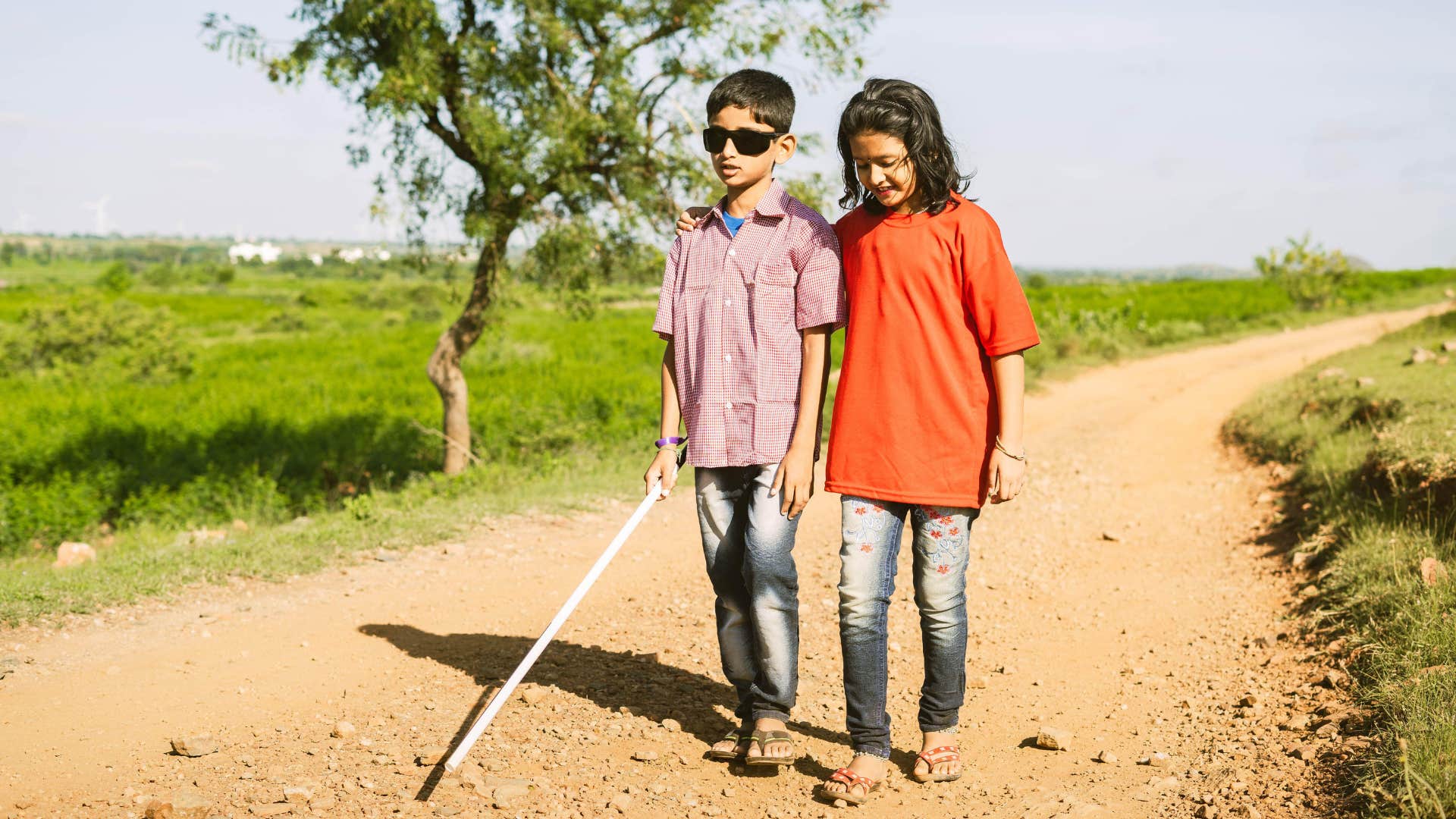11 Deep Philosophical Life Lessons Elsa Taught Us In The Movie Frozen
You might be surprised by how insightful this animated movie really is.
 Disney
Disney If we watch carefully, we can glean a good deal of wisdom from the nuanced media we consume on a daily basis. Even a simple kids' movie, like Disney's “Frozen,” has lessons to offer us as we go about our life journey. "Frozen" is a magical story about two sisters, with themes of identity, courage, authenticity, and true love that remind us of what really matters even when things seem chaotic and overwhelming.
When we embrace our authentic selves, nourish all the relationships in our lives, and work toward containing fear-based narratives and limiting beliefs, everything else changes for the better. There are many deep, philosophical life lessons Elsa taught us in the movie "Frozen," but the most significant one is simple: transformation begins with self-acceptance and love.
Here are 11 deep philosophical life lessons Elsa taught us in the movie "Frozen"
1. Freedom comes with responsibility
 Peopleimages.com - YuriArcurs via Canva
Peopleimages.com - YuriArcurs via Canva
Elsa’s journey to finding freedom isn’t just about breaking free from rules, expectations, and rigid boxes. It’s also about how you embody that sense of freedom and the responsibility that comes with it. She may feel liberated tucked away in her ice palace. Still, the consequences, such as a frozen kingdom, her sister in peril, and a community that needs her help, require a level of responsibility.
This is a profound reminder that our choices and liberating endeavors come with responsibility. Even when it’s sometimes uncomfortable to recognize that our personal choices have effects on others, it’s our job to accept accountability and support others, especially when living our most authentic lives.
2. Power without control is chaos
 Africa images via Canva
Africa images via Canva
Elsa’s internal powers were chaotic and dangerous without self-discipline and control, and the same is true for our personal strengths and talents in real life. When we navigate the world without self-awareness and discipline, we’re bound to end up feeling overwhelmed, stressed, and chaotic all the time.
Not only does self-discipline ensure we’re more motivated and productive, as a study published in Frontiers in Psychology suggests, but it also protects our mental health, improving every aspect of our lives.
3. Authenticity is more freeing than approval
 Sol Vazquez Cantero via Canva
Sol Vazquez Cantero via Canva
The movie's most iconic song, “Let It Go,” is a reminder of the universal life lesson that authenticity will always be more freeing than seeking approval and validation from others.
When we embrace authenticity and uniqueness, our entire lives change for the better. We’re not only happier and more fulfilled on our own, but the relationships and opportunities that come into our lives also add a profound sense of value.
4. Avoidance only sparks loneliness
 Biserka Stojanovic from Getty Images via Canva
Biserka Stojanovic from Getty Images via Canva
Many people find comfort in avoidance, but it often creates cycles of loneliness, which are equally discouraging, isolating, and anxiety-ridden.
Genuine connections and intentional relationships bring joy to our lives. When we consistently avoid vulnerability and shield ourselves from forming connections with others, we’re only sabotaging our own well-being. Like Elsa, you have to break free from the confines of avoidance and isolation to fulfill yourself and bring genuine joy to your life.
5. Personal acceptance can be transformative
 Milko from Getty Images Signature via Canva
Milko from Getty Images Signature via Canva
Although gaining self-discipline over her talents and control over her powers is a turning point for Elsa in the movie, the true transformation she experiences is when she accepts herself for who she is. No longer is she hindered by rejection, afraid of being different, or fighting against the nature of her authentic self. Instead, she leans into the power of being her authentic self.
While creating and living as your “true self” may be complicated in the real world, this is still one of the motivating lessons we learn from Elsa. She offers a powerful indicator that change, growth, and acceptance are incredibly transformative.
6. Joy prevails over fear
 cokacoka from Getty Images via Canva
cokacoka from Getty Images via Canva
Even when things in life feel scary and uncertain, joy can give us hope and transform the narrative. They’re two sides of the same coin. When we fear something, there’s another side that we are thrilled, joyful, or excited by. In Elsa’s story, her powers grow uncontrollable when she’s overwhelmed by fear, including the fear of being misunderstood, the fear of being different, or even the fear of herself without discipline.
However, when she connects with her loved ones, like skating with her sister, Anna, her powers transform into something powerfully beautiful. The same is true in our lives, when we accept ourselves and reframe our life stories, struggles, and obstacles through the lens of joy, everything changes for the better.
7. True love isn’t always romantic
 PeopleImages from Getty Images Signature via Canva
PeopleImages from Getty Images Signature via Canva
Even though society often frames true love and soulmates through a romantic lens, Frozen reminds us that platonic love is just as powerful and important. The true turning point in the movie wasn’t being saved by Prince Charming or breaking the curse with a kiss. It was her sister’s embodied love.
Anna’s sacrifice of life for the sake of her sister was a profound reminder that non-romantic love is just as powerful, meaningful, and important as a romantic partner or relationship. Not only do these relationships keep us happier and healthier throughout life, but they also provide a safety net for all uncertainties and struggles, which is the truly unbreakable foundation of our lives.
8. Comfort isn’t always productive
 Alina Matveycheva from Pexels via Canva
Alina Matveycheva from Pexels via Canva
Else’s ice palace in Frozen might’ve been beautiful and secure, but it also kept her completely alone. These literal and metaphorical “walls” from the outside world may have ensured she felt protected, but ultimately sabotaged her ability to connect, love, and experience everything that gives life meaning.
The same is true in our lives. When we hide from conflict, vulnerability, and true connection because we’re afraid of stepping outside our comfort zones, we’re not only less productive, but we’re also less happy and fulfilled. When you open your heart to love and lean into the discomfort of challenge, you grow in more ways than you ever thought possible.
9. Love is about actions, not just words
 lakshmiprasad S from Alamy via Canva
lakshmiprasad S from Alamy via Canva
While verbal expressions of love and phrases like “I love you” can be powerful, the most important aspect of love is action. That’s what the movie Frozen teaches us, and one of the deep philosophical life lessons Elsa taught us when her sister gave her life to break the curse.
Of course, in our lives, these kinds of actions and sacrifices don’t have to be dramatic. It could be keeping promises, showing up for commitments, and prioritizing quality time in relationships. As a study published in the Social and Personality Psychology Compass suggests, actions, like truly supporting someone in a time of need, often promote a healthier relationship and better general health.
10. Hiding who you are sparks inner turmoil
 Diego Cervo via Canva
Diego Cervo via Canva
The life lesson that concealing who you truly are, your inner truth and desires, sparks inner turmoil is one of the deep, philosophical life lessons Elsa taught us. “Conceal, don’t feel” nearly destroyed Elsa entirely, the simple act of turning away from the people, truths, and beliefs that she suppressed deep inside.
Not only does keeping genuine authenticity contained sabotage personal identity and relationships, but suppressing simple emotions can also lead to negative emotional consequences and inner turmoil. Being who we’re meant to be isn’t only about living a fulfilling and authentic life. It’s also about being honest, open, and vulnerable, even when we’re afraid.
11. Growth sometimes requires solitude
 Truecreatives from TrueCreatives via Canva
Truecreatives from TrueCreatives via Canva
While the entire basis of Elsa’s story is the fulfillment that comes with healthy relationships and the journey of accepting love, there’s another part of Frozen that teaches us a profound lesson: growth sometimes requires solitude.
Not only does solitude tend to spark more reflection, self-connection, and self-discovery, as a study from the European Journal of Social Psychology argues, but it also gives us the tools and the social battery to show up as our best selves when we’re around others.
Zayda Slabbekoorn is a senior editorial strategist with a bachelor’s degree in social relations & policy and gender studies who focuses on psychology, relationships, self-help, and human interest stories.

